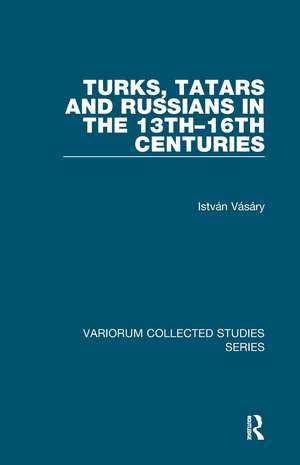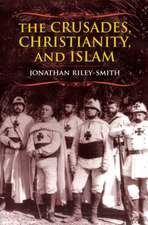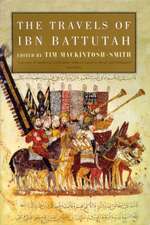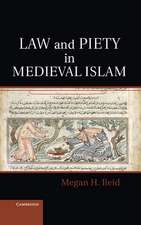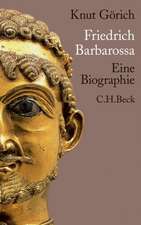Turks, Tatars and Russians in the 13th–16th Centuries: Variorum Collected Studies
Autor István Vásáryen Limba Engleză Hardback – 28 sep 2007
Din seria Variorum Collected Studies
- 9%
 Preț: 938.85 lei
Preț: 938.85 lei -
 Preț: 311.41 lei
Preț: 311.41 lei -
 Preț: 351.48 lei
Preț: 351.48 lei -
 Preț: 313.38 lei
Preț: 313.38 lei -
 Preț: 386.77 lei
Preț: 386.77 lei -
 Preț: 325.68 lei
Preț: 325.68 lei -
 Preț: 396.00 lei
Preț: 396.00 lei -
 Preț: 312.75 lei
Preț: 312.75 lei - 9%
 Preț: 1041.23 lei
Preț: 1041.23 lei -
 Preț: 258.66 lei
Preț: 258.66 lei -
 Preț: 299.55 lei
Preț: 299.55 lei - 9%
 Preț: 938.08 lei
Preț: 938.08 lei -
 Preț: 343.33 lei
Preț: 343.33 lei -
 Preț: 311.18 lei
Preț: 311.18 lei - 9%
 Preț: 937.13 lei
Preț: 937.13 lei -
 Preț: 351.41 lei
Preț: 351.41 lei -
 Preț: 320.00 lei
Preț: 320.00 lei - 34%
 Preț: 764.20 lei
Preț: 764.20 lei - 23%
 Preț: 315.48 lei
Preț: 315.48 lei - 36%
 Preț: 740.06 lei
Preț: 740.06 lei - 34%
 Preț: 764.20 lei
Preț: 764.20 lei - 34%
 Preț: 680.73 lei
Preț: 680.73 lei - 26%
 Preț: 247.40 lei
Preț: 247.40 lei - 34%
 Preț: 485.78 lei
Preț: 485.78 lei - 38%
 Preț: 766.91 lei
Preț: 766.91 lei - 34%
 Preț: 767.07 lei
Preț: 767.07 lei - 34%
 Preț: 764.20 lei
Preț: 764.20 lei - 34%
 Preț: 769.51 lei
Preț: 769.51 lei - 38%
 Preț: 769.85 lei
Preț: 769.85 lei - 34%
 Preț: 826.68 lei
Preț: 826.68 lei - 25%
 Preț: 225.28 lei
Preț: 225.28 lei - 25%
 Preț: 225.54 lei
Preț: 225.54 lei - 34%
 Preț: 736.38 lei
Preț: 736.38 lei - 34%
 Preț: 738.43 lei
Preț: 738.43 lei - 25%
 Preț: 226.52 lei
Preț: 226.52 lei - 33%
 Preț: 491.66 lei
Preț: 491.66 lei - 34%
 Preț: 485.78 lei
Preț: 485.78 lei - 34%
 Preț: 485.78 lei
Preț: 485.78 lei - 36%
 Preț: 739.17 lei
Preț: 739.17 lei - 38%
 Preț: 766.34 lei
Preț: 766.34 lei - 31%
 Preț: 473.94 lei
Preț: 473.94 lei - 18%
 Preț: 843.61 lei
Preț: 843.61 lei - 38%
 Preț: 774.91 lei
Preț: 774.91 lei - 38%
 Preț: 769.92 lei
Preț: 769.92 lei - 34%
 Preț: 764.20 lei
Preț: 764.20 lei - 51%
 Preț: 485.78 lei
Preț: 485.78 lei - 36%
 Preț: 488.49 lei
Preț: 488.49 lei - 34%
 Preț: 769.10 lei
Preț: 769.10 lei - 38%
 Preț: 766.99 lei
Preț: 766.99 lei - 18%
 Preț: 1019.01 lei
Preț: 1019.01 lei
Preț: 875.55 lei
Preț vechi: 1324.13 lei
-34% Nou
Puncte Express: 1313
Preț estimativ în valută:
167.53€ • 175.39$ • 138.63£
167.53€ • 175.39$ • 138.63£
Carte tipărită la comandă
Livrare economică 05-19 aprilie
Preluare comenzi: 021 569.72.76
Specificații
ISBN-13: 9780754659297
ISBN-10: 0754659291
Pagini: 364
Dimensiuni: 152 x 229 x 25 mm
Greutate: 0.45 kg
Ediția:1
Editura: Taylor & Francis
Colecția Routledge
Seria Variorum Collected Studies
Locul publicării:Oxford, United Kingdom
ISBN-10: 0754659291
Pagini: 364
Dimensiuni: 152 x 229 x 25 mm
Greutate: 0.45 kg
Ediția:1
Editura: Taylor & Francis
Colecția Routledge
Seria Variorum Collected Studies
Locul publicării:Oxford, United Kingdom
Cuprins
Contents: Preface; The role of the Turkic peoples in the ethnic history of Eastern Europe; Origins and possible Cuman affiliations of the Asen dynasty; Cuman warriors in the fight of Byzantium with the Latins; The Hungarians or Mozars and the Mešcers/Mizers of the Middle Volga region; The Golden Horde term daruga and its survival in Russia; The institution of foster-brothers (emildäš and kökäldäš) in the Chingisid states; The origin of the institution of basqaqs; Susun and süsün in Middle Turkic texts; Notes on the term tartanaq in the Golden Horde; Bemerkungen zum uigurischen Schrifttum in der Goldenen Horde und bei den Timuriden; Mongolian impact on the terminology of the documents of the Golden Horde; Immunity charters of the Golden Horde granted to the Italian towns Caffa and Tana; Oriental languages of the Codex Cumanicus: Persian and Cuman as linguae francae in the Black Sea region (13th-14th centuries) A contract of the Crimean Khan Mängli Giräy and the inhabitants of Qïrq-Yer from 1478/79; Two Kazan Tatar edicts (Ibrahim's and Sahib Girey's yarliks) (with Shamil Muhamedyarov); Orthodox Christian Qumans and Tatars of the Crimea in the 13th-14th centuries; 'History and legend' in Berke Khan's conversion to Islam; Andrzej Taranowskis Bericht über seine Gesandschaftsreise in der Tartarei (1569) (with L. Tardy); Russian and Tatar genealogical sources on the origin of the Iusupov family; Clans of Tatar descent in the Muscovite elite of the 14th-16th centuries; Muscovite diplomacy with the states of the Orient; Index.
Notă biografică
István Vásáry is Professor of Turkic and Central Asian Studies in the Institute of Oriental Studies, Loránd Eötvös University, Budapest, Hungary.
Descriere
The setting for the studies collected here is the West-Eurasian steppe region, extending from present-day Kazakhstan through southern Russia, Ukraine and Moldavia to the Carpathian Basin. The first articles deal with pre-Mongol, Turkic peoples of the region and their relations with the Byzantine Empire to the south, but the core of the volume is the history of the Golden Horde and its successor states, such as the Kazan and Crimean Khanates, whose Turco-Mongol overlords are often referred to as Tatars. These played a decisive role in the history of Western Central Asia and Eastern Europe in the 13th-16th centuries and had a fundamental influence on the rise of the Russian state. Particular articles look at Mongol institutions and terminology, others at the interaction of the medieval Tatar and Russian worlds.
